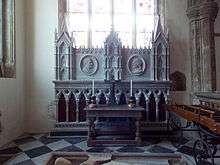Christopher Turnor (MP)
Christopher Turnor MP, JP, DL (4 April 1809 – 7 March 1886), was an English Conservative Party politician who sat in the House of Commons from 1841 to 1847, and a promoter of Lincolnshire architecture.
Christopher Turnor | |
|---|---|
| Member of Parliament for South Lincolnshire | |
| In office April 1841 – 1847 | |
| Personal details | |
| Born | 4 April 1809 |
| Died | 7 March 1886 (aged 76) |
| Nationality | English, British |
| Political party | Conservative |
| Known for | Member of Parliament |
Christopher Turnor was educated at Trinity College, Cambridge. He was a Deputy Lieutenant of Lincolnshire, a justice of the peace for parts of Kesteven and Lindsey in Lincolnshire, and High Sheriff of Lincolnshire in 1834. Turnor was elected as a Member of Parliament (MP) for South Lincolnshire in April 1841, and served until the 1847 general election. He was a member of the Carlton Club.[1][2][3][4]
Christopher Turnor's great grandfather was Edmund Turnor (c. 1708–1769), of Stoke Rochford in Kesteven, and Panton in East Lindsey, Lincolnshire. His father was Edmund Turnor (1755–1829), FRS, FSA, MP for Midhurst, antiquarian, and the author of Collections for the History of the Town and Soke of Grantham Containing Authentic Memoirs of Sir Isaac Newton.[2][5]
Turnor married on 2 February 1837 Lady Caroline Finch-Hatton (6 July 1816 – 13 March 1888), daughter of George Finch-Hatton, 10th Earl of Winchilsea (1791–1858). The Finch-Hatton family owned lands in Hertfordshire and parts of Hatton Garden in London. Turnor's son was Edmund Turnor (24 March 1838 – 15 December 1903), Member of Parliament for Grantham in 1868, and for South Lincolnshire from 1868 to 1880. A second son was Christopher Hatton Turnor (b. 16 Dec 1840), whose son was Christopher Hatton Turnor, author and architect, of Stoke Rochford (23 November 1873 – 1940), who married on 7 August 1907 Sarah Marie Talbot, daughter and heir of Admiral The Hon. Walter Cecil Carpenter, formerly Talbot.[2][5][6]
Architecture

Christopher Turnor's property and seat was the now Grade I listed Stoke Rochford Hall, today a hotel and conference centre. In 1839 architect William Burn was commissioned by Turnor to rebuild the previous 1794 Hall in Jacobean style, while the estate was emparked, extended and redesigned which required the removal of the village of North Stoke, its ecclesiastical parish being conjoined to South Stoke. The associated 20,000 acres (80 km2) of the Stoke Rochford Estate, at the time the third largest in Lincolnshire, is still owned by the Turnor family. Turnor rebuilt and added houses and designed farm building complexes throughout Lincolnshire to a unified and coherent design using local materials. He provided for building design not just in Lincolnshire, or in Stoke Rochford which he turned into an estate village. His particular church and farmhouse additions and alterations were at Great Ponton, Panton, Lissington, Langworth, East Torrington, East Barkwith, Wragby, Binbrook and Kirmond le Mire. Turnor also promoted Lincolnshire county railways. While in London the Turnor's family home was 34 Chesham Place, Belgravia.[5][7][8][9]
Christopher Turnor designed his and his wife's memorial for the north chancel chapel in St Andrew and St Mary's Church, Stoke Rochford.[9]
References
- The Acre-ocracy of England: A List of All Owners of Three Thousand Acres and Upwards (1876) p. 195, from The Modern Domesday Book by John Bateman. Reprint Kessinger (2009). ISBN 1104476576
- Raineval, Melville Henry, Marquis of Ruvigny and (1994) [1911]. The Plantagenet Roll of the Blood Royal: The Mortimer-Percy Volume (Reprint ed.). Genealogical Publishing. pp. 129, +M.P+d.+1886&hl=en&sa=X&ei=NDCoVNO_DtLkao7SgogP&ved=0CCIQ6AEwAA#v=onepage&q=Christopher%20Turnor%2C%20M.P%20d.%201886&f=false 130, 392. ISBN 0806314354.
- Fox-Davies, Arthur Charles (1905); Armorial families : a directory of gentlemen of coat-armour, Edinburgh: T C & E C Jack, p. 322
- "No. 19125". The London Gazette. 4 February 1834. p. 206.
- "The Diaries of Dora Turnor" Archived 12 October 2014 at the Wayback Machine, Chetham's Library. Retrieved 3 January 2015
- "Turnor", Kellys Handbook to the Titled, Landed & Official Classes for 1923, Kelly's Directories; 49 edition
- Historic England. "North Stoke (325460)". PastScape. Retrieved 3 January 2015.
- "Stoke-Mandeville - Stoke, West", in A Topographical Dictionary of England, ed. Samuel Lewis (London, 1848), pp. 220–224
- Squires, Stewart; "Christopher Turnor 1809-1886 and his Influence on Lincolnshire Buildings" Archived 4 January 2015 at the Wayback Machine, Historic Farm Buildings Group, Institute of Historic Building Conservation. Retrieved 3 January 2015
External links
| Parliament of the United Kingdom | ||
|---|---|---|
| Preceded by Henry Handley Gilbert Heathcote |
Member of Parliament for South Lincolnshire 1841 – 1847 With: John Trollope |
Succeeded by William Cecil John Trollope |